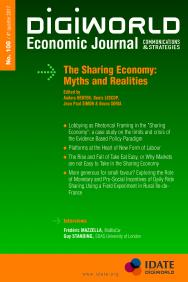
| Author(s) |
Dianzhuo ZHU |
| Publication type | Research Paper |
| Reference | DigiWorld Economic Journal, No. 108, 4th Q. 2017, pp. 77-97 |
This paper conducts a field experiment with a spontaneous short-distance ridesharing company to understand the interaction of monetary and pro-social motivations of drivers. Drivers pick up passengers (hired by the author) without knowing the amount that they will be paid, and can decide privately and freely after the trip whether to receive
payment, to donate it to charity or to do nothing. Both monetary and pro-social motivations are found to be relevant. However, pro-social incentive works better for short-distance (5 km) trips, while monetary incentive seems to be more efficient for long-distance (20 km) trips. Drivers tend to be more generous to give up their compensation when the favour they offer is small. The author discusses the importance of taking pro-social motivations into design of daily ride-sharing, especially when the sector focuses on monetary incentive of the date.

























